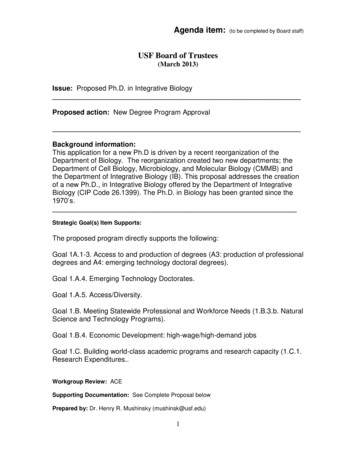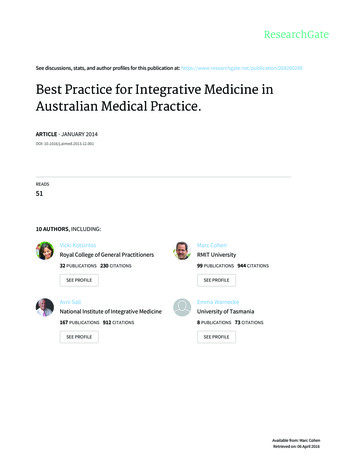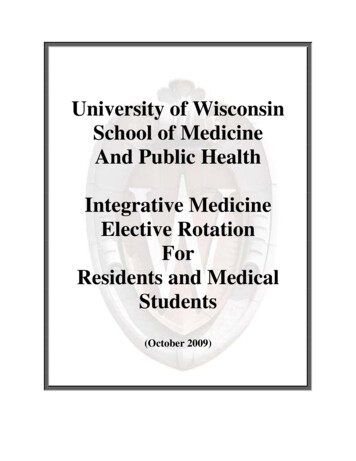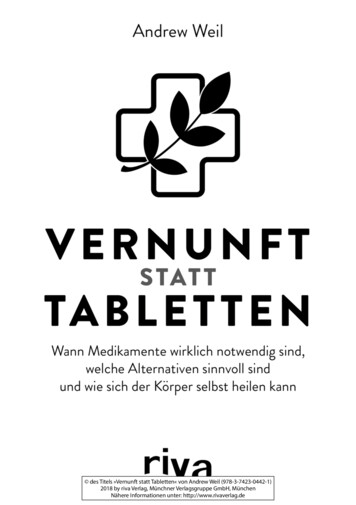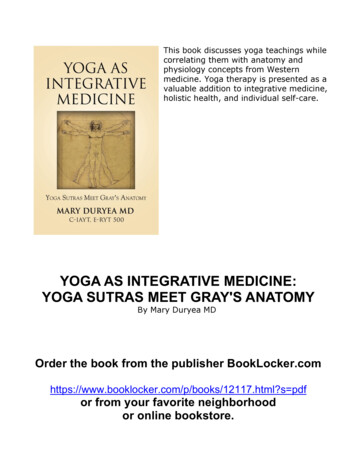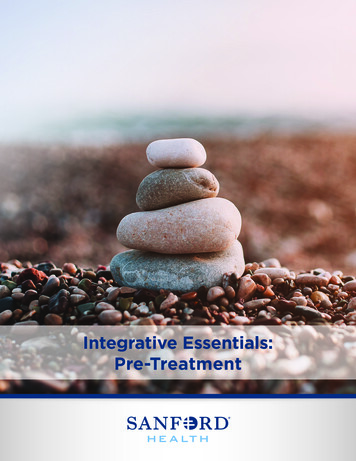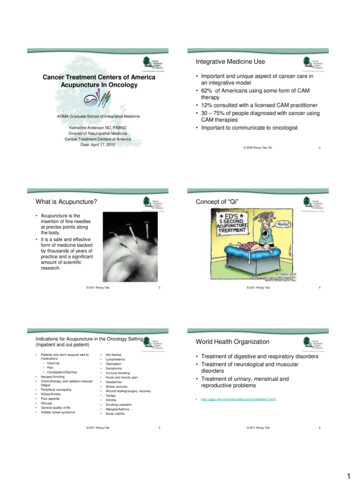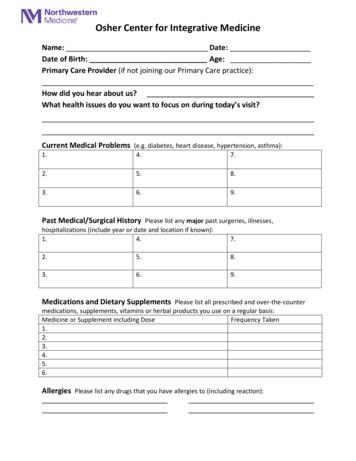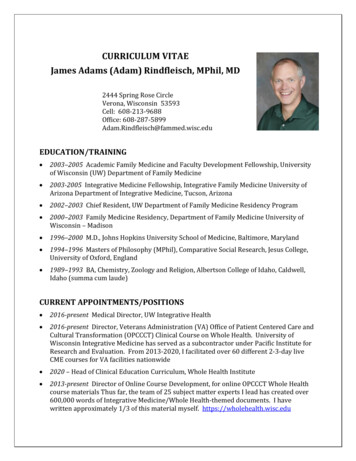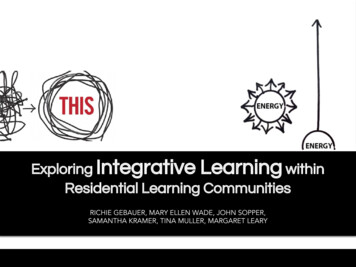
Transcription
Exploring Integrative Learning withinResidential Learning Communities
Multi-Institutional Study
Research Questions
Integrative Learning
Pre-Survey
Validity & Reliability Reliability StatisticsAssessment and Self-ReflectionConnections to DisciplinesTransferChronbach’s AlphaN of ItemsChronbach’s AlphaN of ItemsChronbach’s AlphaN of Items.8114.7913.7654
Principal Components Analysis
Post Surveyoo
FINDINGSPaired Samples t TestCategorical ValuePre-Surveyn 126Post-Surveyn 126tSig. (2-tailed)TransferM 13.71SD 3.408M 14.61SD 3.618-2.629.010Connections toExperienceM 21.94SD 4.270M 22.75SD 4.578-1.976.050Connections toDisciplines/CoursesM 9.14SD 2.845M 10.34SD 2.737-4.435.000Assessment andSelf-ReflectionM 14.90SD 3.153M 15.59SD 3.120-2.292.024
FINDINGS
Writing Assignment
Updated Research QuestionsIs there a relationship between Academic & StudentAffairs collaboration and the practice of integrativelearning in RLCs?i. How is collaboration in RLCs betweenacademic and student affairs defined?ii. Which elements of collaboration betweenacademic and students affairs foster thepractice of integrative learning?iii. How can we measure students’ practice ofintegrative learning in RLCs?iv. Is there a relationship between studentself-reported gains or losses in integrativelearning and direct measures of integrativelearning.v. Do student self-reported gains or losses inintegrative learning predict directmeasures of integrative learning?
ACCOMPLISHMENTS
Next Steps Administration of the post-survey instrument in April/MayAdministration and collection of student-produced course assignments from all 6 campuses.2nd norming of the AAC&U Integrative Learning VALUE rubricScoring of all collected assignments based on this rubricData analysis in the form of a paired samples t test and independent samples t test toanswer research sub-questions #3 and #4 and a Pearson correlation to answer researchsub-question #5.Examine our findings connected to student experiences with integrative learning to exploreour central research question, “is there a relationship between academic affairs and studentaffairs collaboration and the practice of integrative learning in RLCs?”
ReferencesAssociation of American Colleges and Universities (AAC&U). (2009). Integrative learning VALUE rubric.Retrieved from rning.Barber, J. P. (2012). Integration of learning: A grounded theory analysis of college students’ learning.American Educational Research Journal, 49(3), 590-617.Boix Mansilla, V. (2008). Integrative learning: Setting the state for a pedagogy of the contemporary.Peer Review, 10(4), 31.Booth, A., McLean, M., & Walker, M. (2009). Self, others, and society: A case study of universityintegrative learning. Studies in Higher Education, 8(34), 929-939.DeZure, D., Babb, M., & Waldmann, S. (2005). Integrative learning nationwide: Emerging themes andpractices. Peer Review, 7(4), 24-26.Inkelas, K. K. & Soldner, M. (2011). Undergraduate living learning programs and student outcomes. InSmart, J. C. & Paulsen, M. B. (Eds.), HIgher education: Handbook of theory and research, Vol. 26 (pp.1-55). New York, NY: Springer.Klein, J. T. (2005). Integrative learning and interdisciplinary studies. Peer Review, 7(4), 8-10.Mahoney, S. & Schamber, J. (2011). Integrative and deep learning through a learning community: Aprocess view of self. The Journal of General Education, 60(4), 234-247.Newell, W. H. (2010). Educating for a complex world: Integrative learning and interdisciplinary studies.Liberal Education, 96(4), 6-11.
- Questions
Wade, M.E., Gebauer, R., Muller, T., Kramer, S., Leary, M. & Sopper, J. (2019, February). Exploring Integrative Learningwithin Residential Learning Communities. Presentation at the 38th Annual Conference on the First Year Experience, LasVegas, NV.INTEGRATIVE LEARNING REFLECTION PAPER PROMPTReflection Paper: My First Year1During your time at [insert college name], you have been challenged to integrate knowledge gained both in and out of theclassroom to other experiences and situations. This way of being, called integrative learning, is not just one centered inyour college experience, but in all facets of life during your lifetime. It involves being able to do the following: Make connections between your experiences and academic knowledge,consider a variety of perspectives on a discipline or topic,adapt and apply skills, abilities, theories, methodologies gained in one situation to new situations, anddemonstrating a sense of self as a learner through reflection.The Assignment:With this in mind, you are to write a 1,000-1,100 word culminating reflection on your first year at [insert college name].When writing this paper, you should consider the following questions: Reflect on the classes you took in [insert RLC name] over the course of the year. Reflecting on the topics covered,where can you make connections between content covered in one course to another course(s) you took?Did you find yourself applying knowledge from a course to your experiences outside the classroom inconversations, assignments, jobs, or other ways? If yes, please describe and give specific examples.Can you think of examples of times where you applied knowledge gained in one context to a new, differentcontext? If yes, please describe and give specific examples.What have you learned about yourself in regard to your individual learning style during your first year? Pleasedescribe the courses, experiences, and/or situations that contributed to this understanding.Considerations:Your reflection could take into consideration all aspects of your first-year experience. Keep in mind: 1Your academic experiences- including but not limited to: Courses you have taken Projects or assignments you have worked on Lectures or events you have been required to attend for a class Relationships with faculty and advisors Components of your [insert RLC name] experience (ex. [insert brief description of what these are])Your personal experiences- including but not limited to: Relationships you have formed with peers, residential life staff, and/or faculty in residence Involvement in campus clubs, activities, organizations and/or out of the classroom experiences Participation in service Living on campus Events you have attendedThis assignment will be administered to students on our campuses and will be evaluated using an adapted version of the AAC&UValue Rubric. Our version includes the sections on Connections to Experience, Connections to Discipline, Transfer, and Reflection andSelf-Assessment. We have a separate document that includes the administration protocol and planned rubric norming activity.
Mahoney, S. & Schamber, J. (2011). Integrative and deep learning through a learning community: A . within Residential Learning Communities. Presentation at the 38th Annual Conference on the First Year Experience, Las . your college experience, but in all facets of life during your lifetime. It involves being able to do the following:
